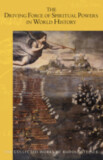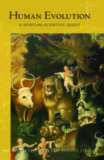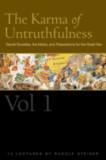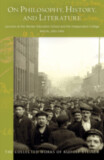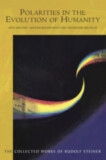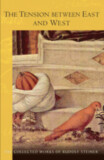Europe between East and West
In Cosmic and Human History (CW 174a)
- Publisher
Rudolf Steiner Press - Published
10th September - ISBN 9781855846623
- Language English
- Pages 312 pp.
- Size 6" x 9.25"
12 lectures, Munich, Sept. 13, 1914 – May 4, 1918 (CW 174a)
In this wide-ranging series of lectures, Rudolf Steiner sheds new light on the spiritual background to the outbreak of World War I in Europe. Spiritual entities stand behind the various peoples of the world, he says, and describes how those beings—“folk souls”—relate to the cultural diversity of Europe, America, and the East, speaking of their unique tasks and destinies in relation to the deeper causes of the catastrophic war. Central Europe has the special mission of mediating among the Western world, the Slavic countries, and, by extension, the East. Steiner alleges that Western secret societies consciously suppressed the spiritual life of this central cultural region through malign activities. These same brotherhoods also exploited H. P. Blavatsky’s occult faculties for their own ends.
Given in Munich between 1914 and 1918—and published in English for the first time—Rudolf Steiner addresses an array of topics in these lectures, including the potential elimination of the soul through specific medicines; intelligence testing as an expression of an ahrimanic trend; the stunted condition of inner development of many people after the age of twenty-seven; the effects in the spiritual world of those who die young; how war teaches selflessness; and the significance of Michael for the appearance of Christ in the etheric. The volume also features an introduction by Terry Boardman, editorial notes and an index.
This volume is a translation from German of Mitteleuropa Zwischen Ost und West. Kosmische und Menschliche Geschichte Band VI, Rudolf Steiner Verlag, 2nd ed., 1994 (GA 174a).
C O N T E N T S:
Introduction by Terry M. Boardman
Lecture 1. The spiritual background to the outbreak of war. Symptomatic events at the start of hostilities. Robert Michel on the support of positive thoughts. War as educator of selflessness. Incisive events: the Punic Wars; migration of people in the present war. Mantric verses for co-experiencing current events.
Lecture 2. The connection of the individual with one’s folk soul in waking and sleeping. The unique natures of the French, Italian, and Russian folk souls. The significance of Michael for the appearance of Christ in the etheric. The reversal of war’s constellation in the spiritual world. Disastrous effects of imaginations that do not surface to consciousness. The connection of German occultism with the spiritual life of the people. The contrast between German and British occultism. The serious nature of the times.
Lecture 3. Verses imprinted with real soul experience for friends who have died. The importance of the moment of death for life before a new birth. The diversity of peoples of Europe—their tasks and destinies. The effects of spiritual powers behind the events of war. The separation from the Theosophical Society in the context of war between Britain and Germany.
Lecture 4. The importance of those who have died for the work of anthroposophy. Soul experiences after death. “I”-consciousness through the retrospective after death. Going backward through sleep experiences immediately after death. The effect in the spiritual world of those who died young. The serious nature of the times.
Lecture 5. Annie Besant’s defamation of anthroposophy. The being of a Russian person. Representatives of Central Europe on their way toward spiritual science. In the west no bridge between official spiritual life and occultism. The conscious suppression of Central European spiritual life by Western secret societies. The appearance and destinies of H.P. Blavatsky—use of her occult faculties for the goals of Western occultism. The machinations of Western secret societies. The murder of Jaurès. The connection of these with slander by Annie Besant.
Lecture 6. The genesis of the physical body. the connection of our ether bodies with the animal kingdom and our astral bodies with the plant kingdom. Inklings of these connections by Oken and Schelling. The work of the hierarchies on the elements of our being. Spiritual-scientific thinking and sense in practical life—Karl Christian Planck. The ancient wisdom in painting by Master Bertram. The Brothers Karamazov by Dostoyevsky. Changes in the behavior of many human beings since the start of war. Krapotkin.
Lecture 7. The significance of the fourth and fifth post-Atlantean epochs. The increasing youthfulness of humanity. The stasis at the age of twenty-seven—Rudolf Euken and Woodrow Wilson. Practical knowledge of life through spiritual science. Remembrance of those who have died—Ludwig Deinhard and Prof. Sachs. When personality projects into society. Two measures as a consequence.
Lecture 8. Insufficient courage to work on oneself—Maurice Barrès. Destruction of the ideas of the French Revolution through mere theorizing. Validity of the ideals of brotherliness, freedom, and equality for body, soul, and spirit. Elimination of the spirit at the Council of 869; elimination of the soul through specific medicines. Confusion in conceiving Christ’s impetus. Adolf Harnack. The enforced initiation of Roman Caesars. Current deficiency of will in thinking. The specious comparisons of state with organism in Kjellél. The damage to spiritual science from bringing the personal into the societal.
Lecture 9. The significance of spiritual science for the twentieth century. Reversal of consciousness conditions after death. Impulses of historical life in dreamlike experience. Historians’ errors. Converse with those who have died. The corruption of modern thinking. The essential nature of alert and intensive pictorial thinking for interacting with the dead. The different ways in relating to those who died young and those who died old. Grasping reality through spiritual science.
Lecture 10. The unconscious spirituality of our times. The tasks of ahrimanic beings and archangels. Michael’s spiritual fight. Mirroring events before and after 1879: 1844–1879–1914. The meaning for our times of the sequence of folk souls. Deeper causes of the world catastrophe. Abstraction in modern thinking and its essential conscious spiritualization. Alexander Moszkowski, honest representative of materialism.
Lecture 11. Growing enmity toward anthroposophy. The tendency to comfortable thinking and egoism. Misunderstanding as an expression of contemporary tendencies. Awakening a mood of expectation is a task of education today. Intelligence testing—an expression of an ahrimanic trend. Independent knowledge of reality through spiritual science. Contrasting head and limbs. The effects of folk souls in the various elemental realms. Becoming aware of contemporary needs through spiritual science.
Lecture 12. Characterizing contemporary trends—bigotry in thinking, mean pedantry in feeling, clumsy ineptitude in willing. The destiny of Johann Heinrich Lamberts. Widening experience by observing rhythms in the world. Lloyd George as a representative of our times. The ancient spirituality of Rabindranath Tagore. Spurs to a new spirituality in German spiritual life. President Wilson as a representative of the American state of soul. The stunted state of many after age twenty-seven. The chaotic dawning of real spiritual knowledge in Otto Weininger. Imagination, intuition, and inspiration in life after death. Children’s urge to imitate as a continuation of pre-birth soul stance. The cooperation of those who have died in resolving life’s great questions.
NotesRudolf Steiner’s Collected Works
Significant Events in the Life of Rudolf Steiner
Rudolf Steiner
Rudolf Steiner (b. Rudolf Joseph Lorenz Steiner, 1861–1925) was born in the small village of Kraljevec, Austro-Hungarian Empire (now in Croatia), where he grew up. As a young man, he lived in Weimar and Berlin, where he became a well-published scientific, literary, and philosophical scholar, known especially for his work with Goethe’s scientific writings. Steiner termed his spiritual philosophy anthroposophy, meaning “wisdom of the human being.” As an exceptionally developed seer, he based his work on direct knowledge and perception of spiritual dimensions. He initiated a modern, universal “spiritual science” that is accessible to anyone willing to exercise clear and unbiased thinking. From his spiritual investigations, Steiner provided suggestions for the renewal of numerous activities, including education (general and for special needs), agriculture, medicine, economics, architecture, science, philosophy, Christianity, and the arts. There are currently thousands of schools, clinics, farms, and initiatives in other fields that involve practical work based on the principles Steiner developed. His many published works feature his research into the spiritual nature of human beings, the evolution of the world and humanity, and methods for personal development. He wrote some thirty books and delivered more than six thousand lectures throughout much of Europe. In 1924, Steiner founded the General Anthroposophical Society, which today has branches around the world.



